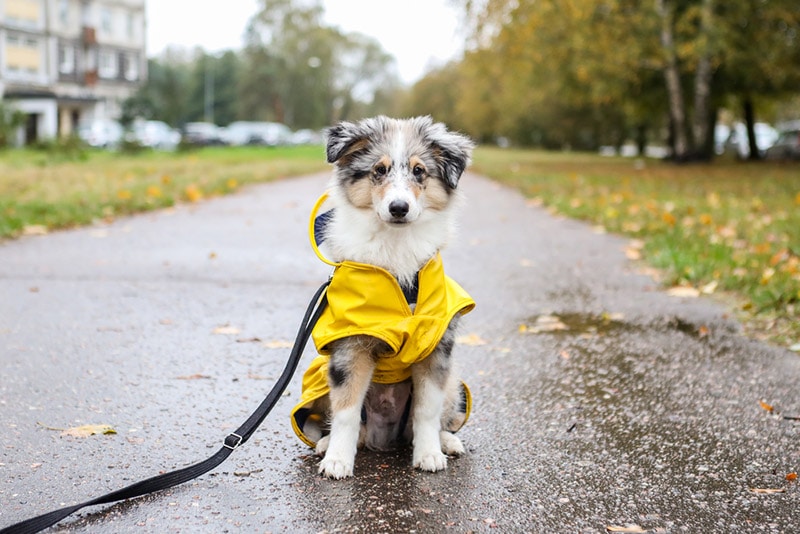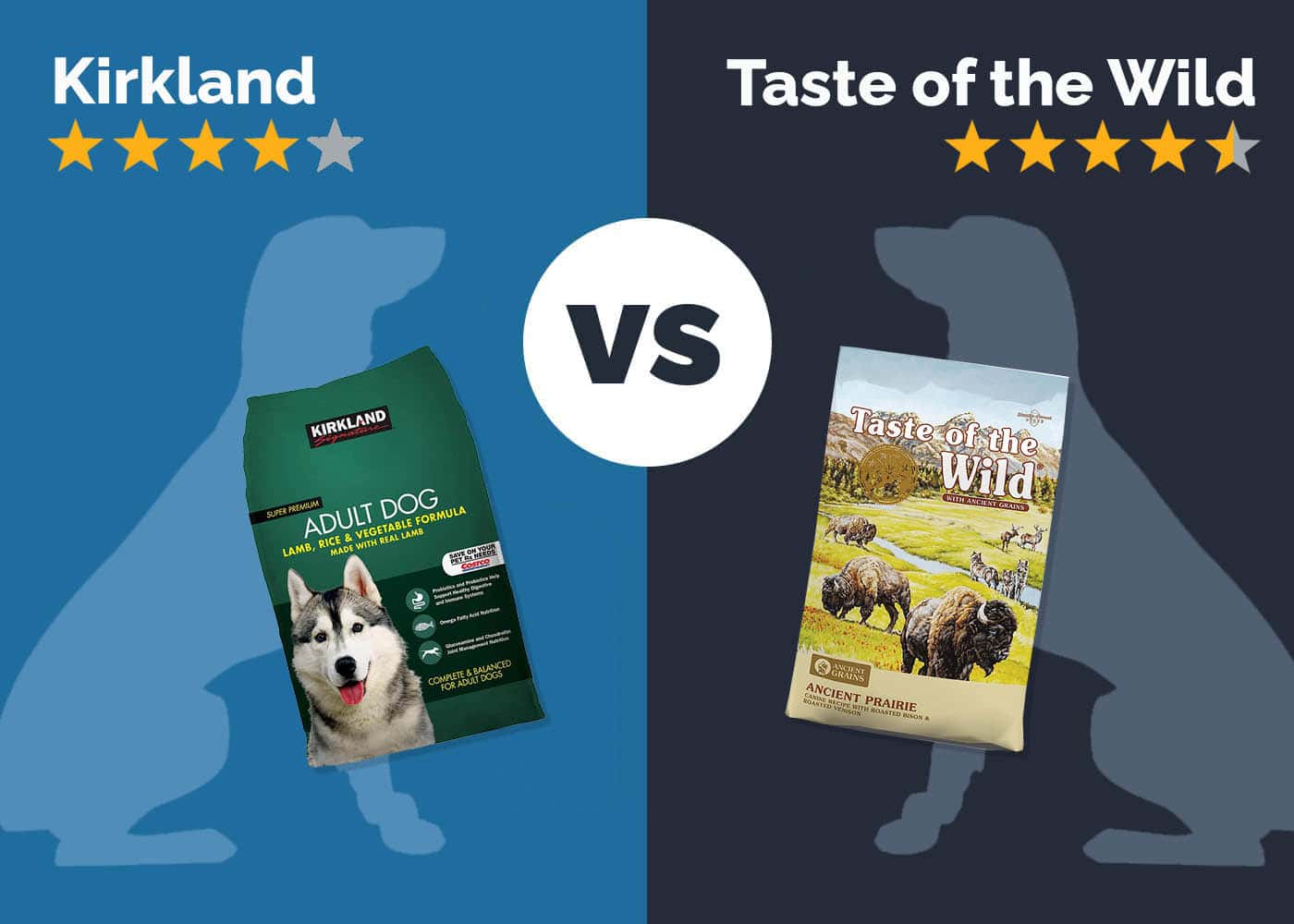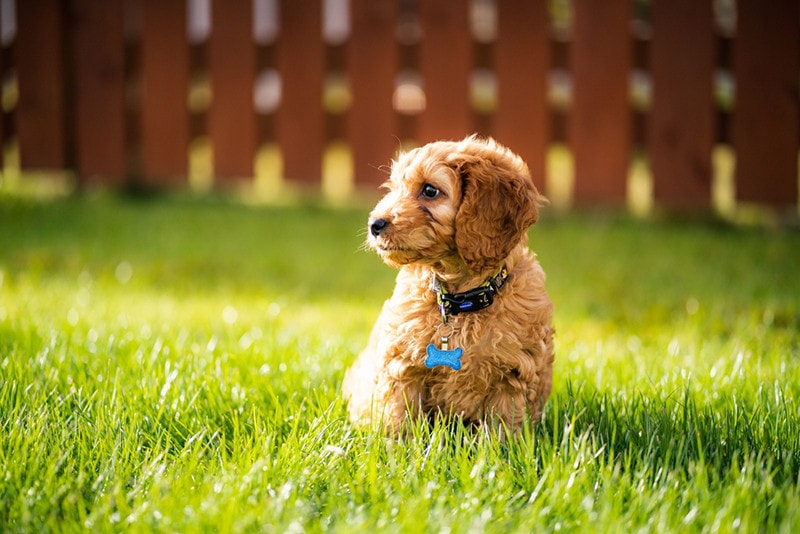My Dog Ate Maggots: Vet Approved Facts, Risks & What to Do
Updated on
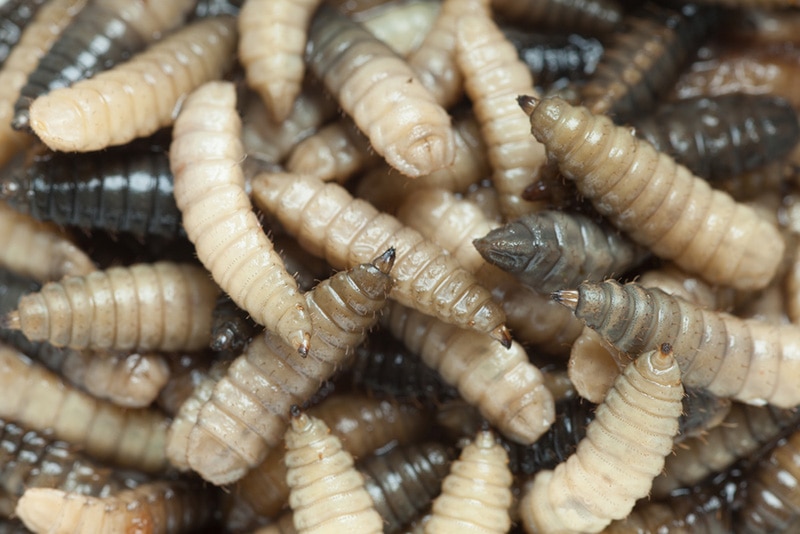
Click to Skip Ahead
Gross as it may be, maggots on their own are not harmful for dogs to eat. But if your dog ate rotten food along with the maggots, they might experience gastrointestinal upset. Either way, a visit with your vet is likely in order.
Here, we discuss what you should look out for after you’ve caught your dog eating maggots and when you should take them to your veterinarian.
What Exactly Are Maggots?
Maggots are the larvae of houseflies. Houseflies have four stages of their lifecycle: eggs, larvae, pupae, and adults. When a fly lays their eggs, they do so close to or on a good food source, which tends to be a carcass or rotting food. The maggots can hatch in as fast as 1 day! They are essentially eating machines and double in size in less than 2 days, which is when they start to go through a molting phase.
They molt three times, and it’s during the third molt that they burrow into their food source and emerge as an adult housefly. Houseflies live 15 to 30 days, depending on their living conditions. They live longer inside a home but also do well outside during the summer months.
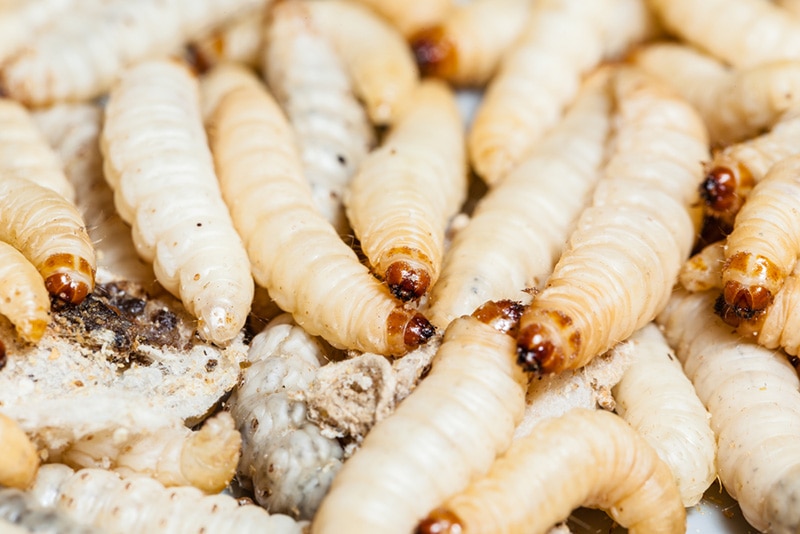
What Can Happen If a Dog Eats Maggots?
The reaction that your dog experiences when eating maggots will depend on how many maggots they ate and whether they ate something that was rotting in addition.
Eating Too Many Maggots
If a dog eats a large number of maggots, they might experience an upset stomach. It can affect them for 24 to 48 hours, and signs might include diarrhea, nausea, and vomiting.
One thing that you shouldn’t worry about is maggots living inside your dog. The maggots will die quickly, some from being chewed up, but lack of oxygen and the digestive acid in the stomach will kill off the rest.
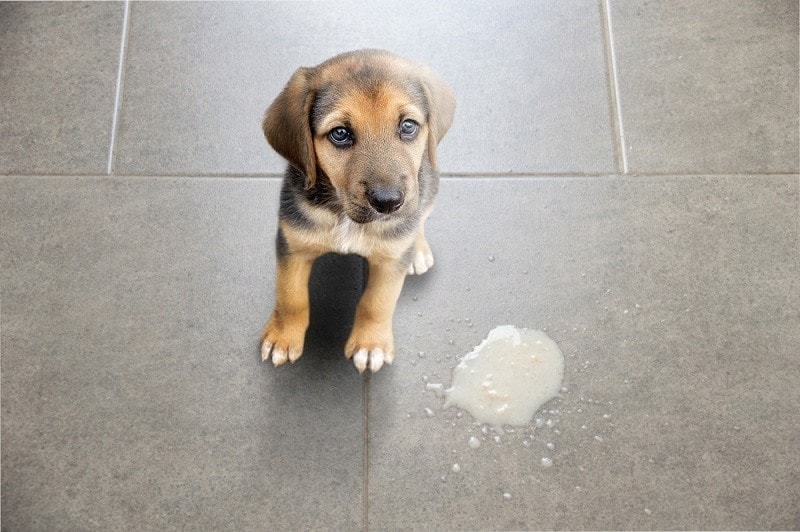
Bacteria
While maggots are not harmful to dogs when eaten, if they ingested something contaminated with harmful bacteria, these could be passed on to the dog. Again, your dog may experience an upset stomach with ingestion of these bacteria, including vomiting, diarrhea, or nausea. They may also develop more severe infections that may cause a fever, bloody diarrhea, or stomach pain.
Eating Rotting Meat
Maggots are most often found on meat, especially decomposing animal carcasses, which makes it likely that your dog ate some of the meat as well.
Eating rotting meat can lead to food poisoning and serious illnesses from parasites and bacteria. Signs of food poisoning can include:
- Diarrhea
- Vomiting
- Lack of appetite
- Dehydration
- Lethargy
More serious cases can result in:
- Lack of coordination
- Tremors
- Seizures
- Collapse
The severity of the food poisoning depends on how much meat was eaten and how decomposed it was.
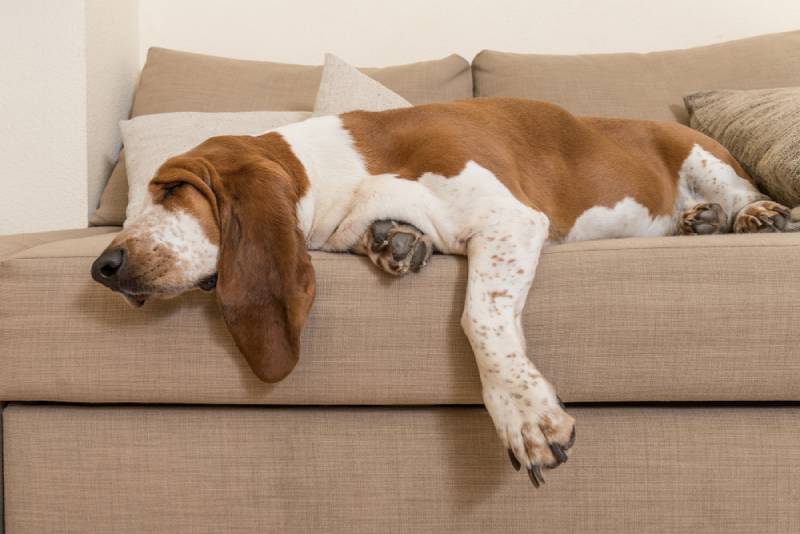
Eating Poop
Dogs are renowned for their propensity for eating feces, and it’s also a known fact that flies like to lay their eggs on poop.
Normal poop isn’t always harmful to dogs, particularly if it’s from a domestic dog (though you still shouldn’t let your dog eat poop). However, if it’s from a wild animal, there might be parasites in addition to the maggots.
Maggots in Dog Food
This scenario is definitely the best one, even if it does include your dog eating maggots. Still, you’ll need to throw out the dog food right away because if maggots are in it, it’s degraded to the point that your dog shouldn’t eat it. Your dog might get a bit of an upset tummy but should be fine otherwise.
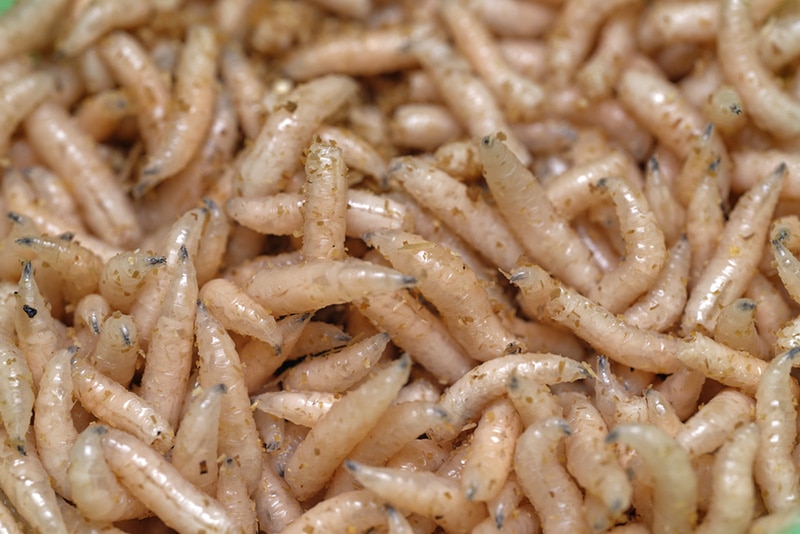
Garbage
Most dogs like to eat garbage, which is a great place for flies to lay eggs, given all the lovely rotten food. But unless the food is laden with bacteria, your dog should be okay after potentially experiencing an upset stomach.
What Should You Do If Your Dog Eats Maggots?
Multiple scenarios can lead to your dog eating maggots. In some cases, you might just need to wait and see what happens, but in others, you should take your dog to the vet.
Wait and Observe
If your dog ate maggots with their dog food, you should observe them to ensure that they aren’t suffering from ill effects. They might experience vomiting and diarrhea, but it should pass within a day or two.
If your dog ate garbage, depending on what they ate, they may just have an upset stomach that will also pass within a few days. But you might want to call your vet in this scenario and let them know what food your dog ate in addition to the maggots.
If your dog ate poop and you’re not sure where it came from (i.e., potentially from a wild animal), take your dog to the vet to be on the safe side. If you know that they ate poop from an animal with no known infections or parasites, you should keep an eye on them but still speak to your vet when convenient.
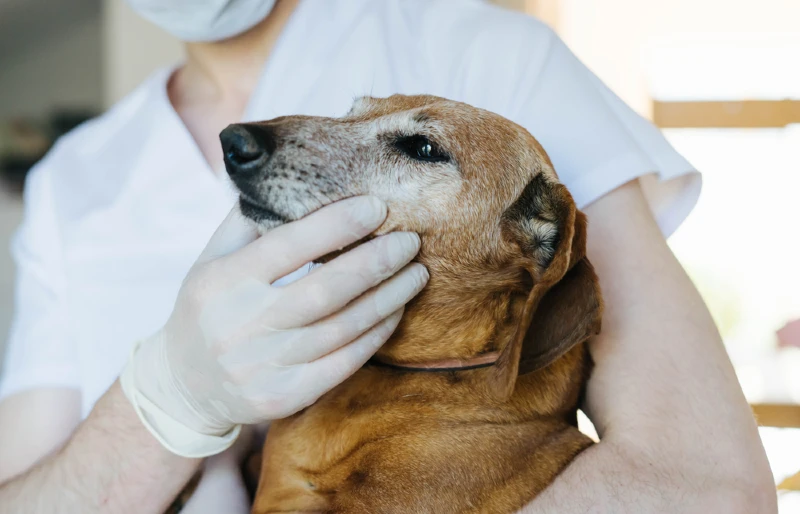
Seek Veterinarian Care
If your dog ate from a dead animal, you should take them to your vet. Your dog may experience vomiting and diarrhea that lasts longer than a couple of days. These cases will often be prescribed antibiotics and other supportive medications. There’s also the possibility of your dog ingesting parasites, particularly from a wild animal. This isn’t an emergency, but they should still be examined and given the appropriate medication.
Regardless of where your dog ate the maggots, note if they develop worrying signs like:
- Rapid heart rate
- Fever
- Heavy panting
- Severe diarrhea
- Frequent vomiting
Your dog can become dehydrated quickly and if so needs medical attention immediately!
How Do You Prevent Your Dog From Eating Maggots?
If your dog loves to eat everything in sight, it might be a challenge, but there are a few steps that you can take to at least reduce the chance of your dog eating maggots.
Avoid Dead Animals
If you find any dead animals on your property, you should have them removed. You can use a professional service, or if you’re going to do it yourself, don’t forget to wear gloves and wash your hands thoroughly afterward. Be sure to check with your municipality about proper disposal.
If you encounter a dead animal during a walk, be sure that you and your dog give it a wide berth. You should also contact your municipality to inform them that a dead animal needs to be disposed of. Keeping your dog on a leash when out and about is important to help prevent them eating maggots as well as keeping them safe from other danger.
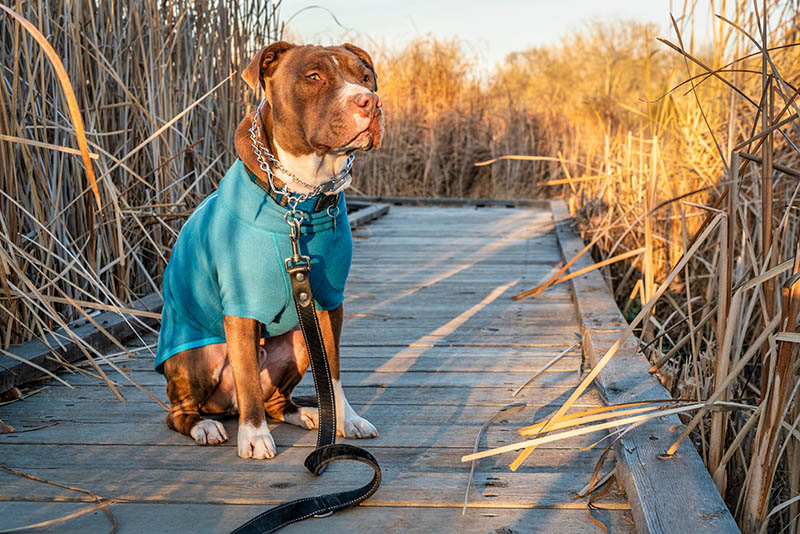
Keep Your Garbage Closed
Cover your garbage so your dog doesn’t have easy access to it. This might require a new locking garbage bin for inside your home—some dogs can be smart and sneaky!
Store the Dog Food Properly
You should place the bag inside a sealed container when you bring home dog food. It’s best to keep the food in the bag; manufacturers use materials designed to keep the food fresh and retain its oils and moisture.
Sealing it up and keeping it in a cool environment will also keep the food fresher for longer and prevent flies from laying their eggs on it.
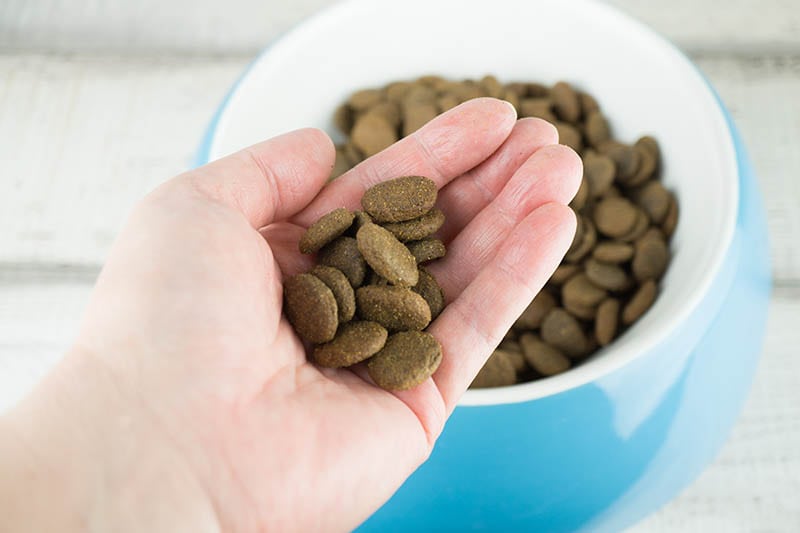
Clean Up Feces
If your dog is in the habit of eating feces, you should be proactive and clean up any poop that you find in your yard. It’s not a pleasant chore but an important one!
Keep your dog on a leash so they don’t make a beeline for any poop that you come across during your walks.
Conclusion
When you catch your dog eating maggots, you don’t need to panic. Maggots can serve as a burst of protein for your dog. However, since maggots are found on decomposing carcasses and other rotting foods, there’s always the chance that your dog could eat some of that as well.
Call your vet and talk to them about what your dog ate, so they can give you advice. They may want you to bring in your dog or just keep an eye on them.
Checking your dog for any maggots on their coat is also a good idea. Maggots can burrow into any open wounds on your dog, and veterinarian support will be necessary.
See Also:
- My Dog Ate Rabbit Poop: Here’s What to Do
- My Dog Ate Vaseline: Here’s What to Do (Vet Approved Advice)
Featured Image Credit: Alexander Knyazhinsky, Shutterstock



